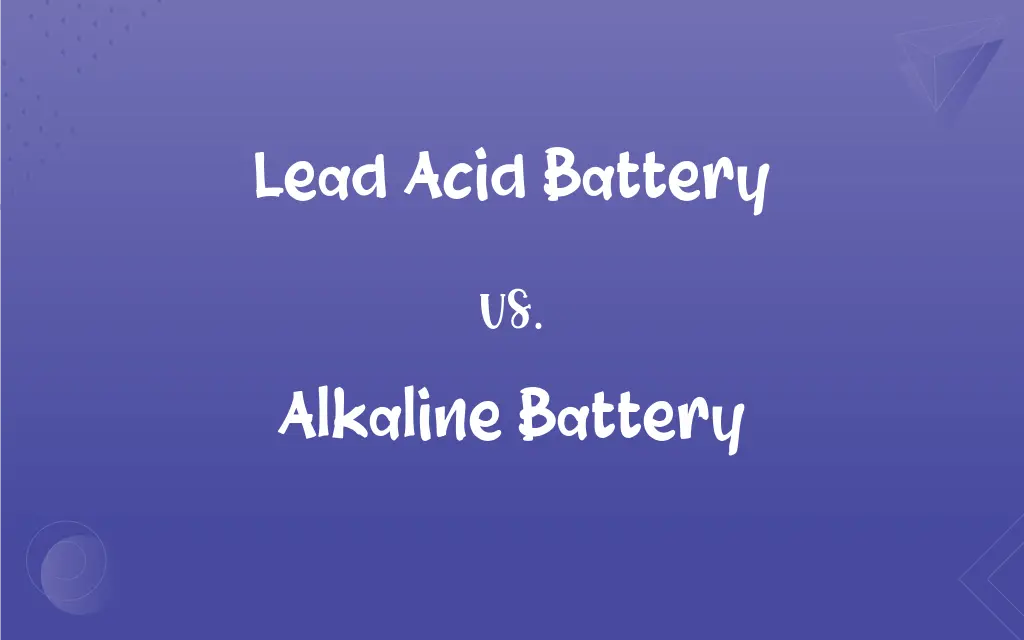Lead Acid Battery vs. Alkaline Battery: What's the Difference?
Edited by Harlon Moss || By Janet White || Published on December 10, 2023
Lead acid batteries are rechargeable, use lead plates and sulfuric acid, and are often in vehicles, while alkaline batteries are disposable, use zinc and manganese dioxide, and power small devices.

Key Differences
Lead acid batteries are characterized by their use of lead plates and sulfuric acid as an electrolyte. They are known for their high power-to-weight ratio and are commonly used in vehicles for starting, lighting, and ignition. Alkaline batteries, in contrast, use zinc and manganese dioxide as their main components. They are known for their long shelf life and are typically used in everyday small electronic devices like remote controls and flashlights.
In terms of rechargeability, lead acid batteries are designed to be recharged and used multiple times. This makes them suitable for applications where constant power supply is essential, such as in cars and uninterruptible power supplies (UPS) systems. On the other hand, alkaline batteries are generally non-rechargeable and are intended for single use, making them convenient for devices with lower power requirements and sporadic use.
The environmental impact and disposal methods differ significantly between the two. Lead acid batteries contain toxic lead and sulfuric acid, requiring careful disposal and recycling to prevent environmental contamination. Alkaline batteries, while less toxic, also require proper disposal or recycling due to the chemicals and metals they contain.
When it comes to cost-effectiveness and initial investment, lead acid batteries are more expensive upfront but can be more cost-effective over time due to their rechargeable nature. Alkaline batteries are cheaper to purchase initially but might end up more expensive in the long run if used frequently, as they need to be replaced after depletion.
The performance of lead acid batteries is affected by temperature and they require regular maintenance, including water level checks and ensuring proper charging. Alkaline batteries are more maintenance-free and perform well across a range of temperatures, but they can leak potassium hydroxide if they are stored for too long or used past their expiration date.
ADVERTISEMENT
Comparison Chart
Main Components
Lead plates, sulfuric acid
Zinc, manganese dioxide
Rechargeability
Rechargeable
Non-rechargeable
Common Uses
Vehicles, UPS systems
Small electronic devices
Environmental Impact
Toxic, requires careful disposal
Less toxic, but requires proper disposal
Maintenance and Performance
Requires maintenance, temperature-sensitive
Low maintenance, stable performance
ADVERTISEMENT
Lead Acid Battery and Alkaline Battery Definitions
Lead Acid Battery
A battery type using lead plates and sulfuric acid.
The car's lead acid battery needed replacement after five years of use.
Alkaline Battery
Commonly used in small electronic devices.
Alkaline batteries are ideal for clocks and flashlights.
Lead Acid Battery
Affected by temperature variations.
In cold weather, the car's lead acid battery can lose efficiency.
Alkaline Battery
Known for a long shelf life and stable output.
The smoke detector requires alkaline batteries for their long-lasting performance.
Lead Acid Battery
Rechargeable battery commonly used in vehicles.
Most automobiles use a lead acid battery for starting the engine.
Alkaline Battery
Less toxic but requires proper disposal.
Used alkaline batteries should be taken to a recycling center.
Lead Acid Battery
Known for its high power-to-weight ratio.
The lead acid battery is ideal for heavy-duty applications due to its power efficiency.
Alkaline Battery
A disposable battery using zinc and manganese dioxide.
I replaced the remote's batteries with new alkaline batteries.
Lead Acid Battery
Requires regular maintenance and water level checks.
He checked the lead acid battery’s water levels as part of routine vehicle maintenance.
Alkaline Battery
Maintenance-free with a risk of leakage over time.
The old alkaline battery in the toy leaked, causing corrosion.
FAQs
What is an alkaline battery?
An alkaline battery is a disposable battery using zinc and manganese dioxide, commonly used in small electronics.
What are the main uses of lead acid batteries?
Lead acid batteries are mainly used in vehicles, UPS systems, and other heavy-duty applications.
What is a lead acid battery?
A lead acid battery is a rechargeable battery using lead plates and sulfuric acid, commonly used in vehicles.
Where are alkaline batteries commonly used?
Alkaline batteries are commonly used in everyday small electronic devices like remote controls and flashlights.
Can alkaline batteries be recharged?
Generally, alkaline batteries are not rechargeable and are intended for single use.
How should a lead acid battery be disposed of?
Lead acid batteries should be recycled at a proper facility due to their toxic components.
Do alkaline batteries require maintenance?
Alkaline batteries are maintenance-free but can leak if stored for too long.
Are lead acid batteries rechargeable?
Yes, lead acid batteries are designed to be rechargeable.
How long do lead acid batteries typically last?
Lead acid batteries typically last 3-5 years, depending on usage and maintenance.
How cost-effective are alkaline batteries?
Alkaline batteries are cheaper initially but may be more expensive in the long run if used frequently.
Are lead acid batteries expensive?
Lead acid batteries are more expensive initially but can be cost-effective over time due to their rechargeability.
How often should a lead acid battery be checked?
A lead acid battery should be checked regularly, typically every few months, for water levels and general condition.
What are the safety concerns with lead acid batteries?
Safety concerns with lead acid batteries include the risk of acid spills and hydrogen gas production during charging.
Are alkaline batteries safe for the environment?
Alkaline batteries are safer for the environment compared to lead acid batteries but should still be disposed of responsibly.
What happens if an alkaline battery leaks?
If an alkaline battery leaks, it can cause corrosion and damage to the device it's in.
What is the environmental impact of alkaline batteries?
Alkaline batteries have a lesser environmental impact than lead acid batteries but still require proper disposal.
Do alkaline batteries have a good shelf life?
Yes, alkaline batteries have a long shelf life and stable output over time.
What is the risk of using an old lead acid battery?
Using an old lead acid battery can lead to reduced performance and potential leakage of toxic materials.
Can a lead acid battery operate in cold temperatures?
Lead acid batteries can operate in cold temperatures but may lose efficiency.
Can alkaline batteries be used in high-drain devices?
Alkaline batteries can be used in high-drain devices but may deplete faster than other types.
About Author
Written by
Janet WhiteJanet White has been an esteemed writer and blogger for Difference Wiki. Holding a Master's degree in Science and Medical Journalism from the prestigious Boston University, she has consistently demonstrated her expertise and passion for her field. When she's not immersed in her work, Janet relishes her time exercising, delving into a good book, and cherishing moments with friends and family.
Edited by
Harlon MossHarlon is a seasoned quality moderator and accomplished content writer for Difference Wiki. An alumnus of the prestigious University of California, he earned his degree in Computer Science. Leveraging his academic background, Harlon brings a meticulous and informed perspective to his work, ensuring content accuracy and excellence.






































































